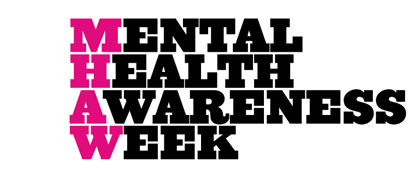 BU recognises that good mental health is vital to living life fully. To educate and help raise awareness around mental health issues, BU is hosting a wide variety of events between Monday 6 and Friday 10 October.
BU recognises that good mental health is vital to living life fully. To educate and help raise awareness around mental health issues, BU is hosting a wide variety of events between Monday 6 and Friday 10 October.
Events include presentations from those suffering from mental illness, and a screening and talk about ‘Finding Mike’- a campaign that went global at the start of the year to find the stranger that stopped mental health campaigner Jonny Benjamin, from taking his own life.
Numerous speakers will visit throughout the week to give both personal and professional views on different mental illnesses and information stands will provide advice and support.
The information below gives the highlights of the week, but for full details and to book onto any of the events, please see the World Mental Health Week Programme.
Monday 6 October
- Talk from the Police and Dorset Healthcare University NHS Foundation Trust about the mental health street triage team; Bournemouth House (BG10), 10am – 11am. More information and to book onto this event.
- Hidden Talents – a group of staff employed by Dorset HealthCare University NHS Foundation Trust who have experienced a mental illness at some time in their life or live with a mental health condition – will give a talk about their experiences; Bournemouth House (BG10), noon – 1pm. More information and to book onto this event.
Tuesday 7 October
- Rick Dyer, Peer Specialist from Dorset Mental Health Forum will give a talk entitled ‘Switched off, Switched on, I have had psychosis’; Student Hall, Talbot House, noon – 1pm. More information and to book onto this event.
Wednesday 8 October
- Consultant Psychiatrist Dr Laurence Mynors-Wallis will give a talk on understanding Schizophrenia; Student Hall, Talbot House, 11am – noon. More information and to book onto this event.
- A screening and talk about ‘Finding Mike’, a campaign that went global at the start of the year to find the stranger that stopped mental health campaigner Jonny Benjamin, from taking his own life; Kimmeridge House, KG01, 1pm – 2.30pm. More information and to book onto this event.
- Mental Health writer Charlotte Walker will talk about ‘The diagnosis of Bipolar-disorder and the power of blogging’; Kimmeridge House, KG01, 3pm – 4pm. More information and to book onto this event.
Thursday 9 October
- Dorset ‘Time to Change’ meeting; Dorset County Council, Dorchester, 10am – noon. Please contact: David Corbin, Equality and Diversity Manager via email: David.Corbin@dhuft.nhs.uk if you wish to attend this meeting.
- A talk on the signs, symptoms and support for those suffering from depression; Student Hall, Talbot House, 1pm – 2pm. More information and to book onto this event.
Friday 10 October
- Abigail Balachandran, who suffered with Bulimia for 10 years and now works for I*EAT, a local eating disorders charity, will give a talk about her experiences;Student Hall, Talbot House, Talbot Campus. 9.40am – 10am. More information and to book onto this event.
- Carer, Miranda Portwood will talk about her own personal experiences of supporting her daughter with anorexia; Student Hall, Talbot House, Talbot Campus, 10.10am – 10:30am. More information and to book onto this event.
- Talk entitled ‘Understanding Eating disorders: the challenges and opportunities’; Student Hall, Talbot House, Talbot Campus, 10.40am – 11:30am. More information and to book onto this event.
- SUBU is signing The Time to Change pledge to make a public statement of aspiration that as an organisation it wants to tackle mental health stigma and discrimination, Dylan’s Bar, Poole House, 1pm – 2pm.
- Mark Storey, a peer specialist for Dorset mental health forum and a professional musician will tell his own mental health story via music; Dylan’s Bar, Poole House, 2pm – 3pm. In 2001 Mark suffered a life changing accident, in 2013 Mark found music again having lost his music career in 2001, and started writing about his lived experience of mental health. Having now created Mental Health Music, Mark’s songs are going round the world and are reaching people in a new way. You can hear him on iTunes or Amazon and YouTube or follow him on twitter @markstorey65.
 Bournemouth University
Bournemouth University